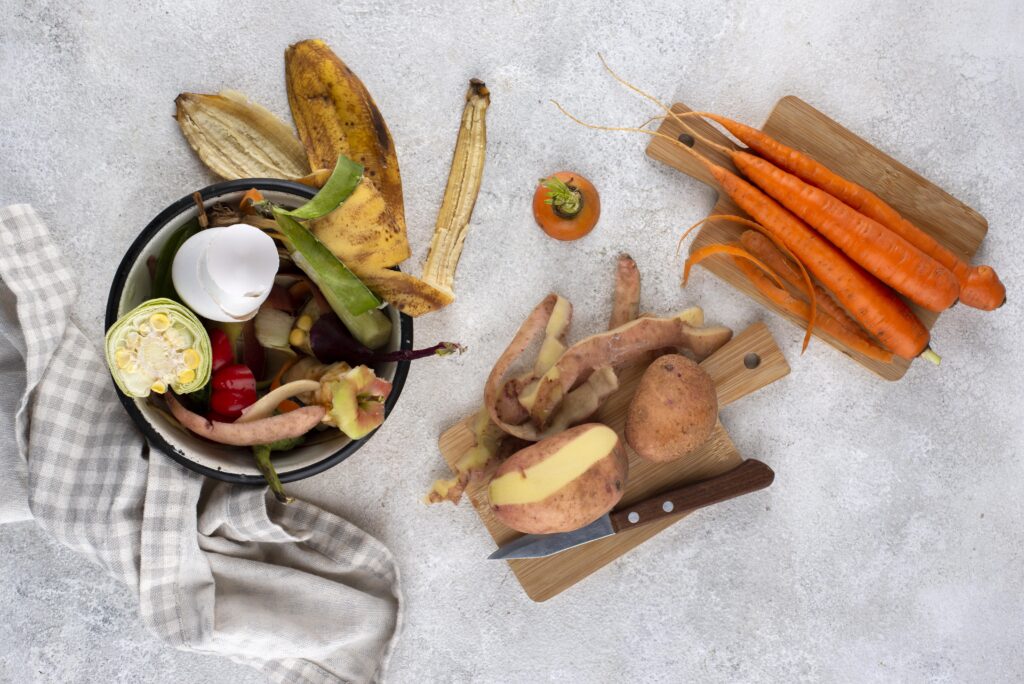
Anyone who knows me well knows that I cannot stand to see food go to waste. I do my best to minimize food waste every day. However, even I have room to improve. As Earth Day nears, now is a great time to think about how our habits impact our planet. Cutting back on food waste is something we can do relatively easily. And collectively, it can make a huge impact.
Food waste is no small problem
According to the UN Environment Programme, we lose or waste one-third of all food produced for humans worldwide each year. In the US, it’s estimated that between 30-40% of the country’s food supply is wasted. That’s about 80 million tons of wasted food every year. And the impact is even greater than you might realize:
- Food that could help reduce food insecurity is instead tossed into landfills.
- Growing, processing, transporting, and storing food that nobody eats wastes resources.
- Wasted produce, packed with beneficial nutrients, doesn’t reach humans.
- Overproduction or low returns can result in unharvested crops, and we also often reject and don’t buy less-than-perfect produce.
Conquering food waste at home
Who hasn’t had at least some produce languish in the refrigerator for so long that it is no longer appealing? In most cases, food wasted at home isn’t unsafe food, it’s just not in prime condition anymore. Preventing food waste at home isn’t difficult, but you need to be proactive. Here are our top tips for dialing back food waste, starting in our own kitchens.
Purchase less fresh produce at a time, more frequently
If you’re a once-a-week shopper, chances are you buy quite a bit of produce all at once. But this increases the likelihood that something you bought won’t be in great condition by the time you eat it. Instead, see if you can buy only the amount of produce that you’ll use in three or four days. Of course, this works best if you’re already planning to go to the store again later in the week. I utilize this technique by doing a once-a-week “big shop” at the bigger grocery store. Then I supplement my fresh produce, when needed, with a quick stop at a smaller market that is closer to my home.
Freeze raw fruits and veggies before they go bad
Sometimes you know you aren’t going to eat those berries, bananas, or that bunch of bok choy. When that happens, pop them into a freezer bag before their quality deteriorates. Frozen fruits are great for smoothies, and many frozen veggies work just fine in soups, stews, or casseroles.
Serve appropriate portions
Sometimes we offer children more food than they need. And then it seems easier to just toss what’s left on the plate instead of wrapping up a few bites. As adults, we may also have developed the habit of serving ourselves big portions of food. Curbing the habit of over-serving takes attention and practice, and goes hand in hand with learning to eat more mindfully.
Save vegetable scraps for broth
I keep a gallon-sized bag of veggie scraps in my freezer most of the time. It’s easy to just add in the ends of a bunch of scallions or the bottom part of celery stalks. When the bag is about half full, I add the scraps to some cooked bones (like from a roast chicken). Then I make a nice broth to either use right away or freeze for later.
Compost what you can’t use
Some fruit and vegetable scraps—like cantaloupe rinds or onion skins—aren’t especially easy to repurpose into actual food. Composting is a simple, good way to get the good out of what might otherwise become trash.